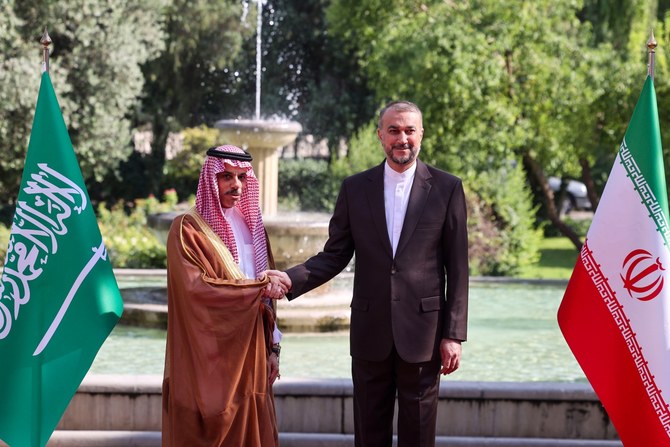
- ARAB NEWS
- 30 Apr 2024

Following last week’s developments regarding a potential prisoner swap between the US and Iran, there have been renewed questions about whether this will kick-start a new round of nuclear diplomacy.
Five US citizens should soon leave Iran in exchange for Tehran gaining access to $6 billion in frozen funds and America freeing several jailed Iranians. On the domestic US side, this was seen by the Republicans as responding to blackmail, which invites hostage-taking situations. Yet, for the Biden administration, it was a diplomatic success. The reality probably lies in between. However, what everyone is whispering is that this is, in reality, part of the nuclear deal.
It is interesting to see how things are shifting in the Middle East. Eight years ago, the Iranian nuclear deal was the main news in the region. But the consequences of the 2015 nuclear deal were not positive for the stability of the region. Many do not know that Arab countries were not against a deal, but they did not understand why the US administration left them in the cold during the execution of the Joint Comprehensive Plan of Action. In turn, the execution of the deal might have been understood by Tehran as being a message allowing it to do whatever it pleases in the region. Today, the hostage swap and the possibility of a return to the nuclear deal is a sort of “who cares?” moment. Many might ask why and how?
Well, there is a simple reason for that. The news that the region cares about took place a few months ago, with the rapprochement between Arab countries and Iran. And this week, observers have focused on the Saudi flag flying high on top of the Kingdom’s consulate in Mashhad, Iran, as well as Mohamed Al-Hussaini, the UAE’s minister of state for financial affairs, discussing efforts to boost cooperation with Iran during a meeting with ambassador Reza Ameri. The difference is that, this time around, the Arab countries did not wait and have not been left in the cold, but are actually ahead of the curve. They have pursued what is in their best interest and initiated an appeasement with Iran. It is also important that Tehran was open to this new phase.
This time around, the Arab countries have not been left in the cold, but are actually ahead of the curve
Khaled Abou Zahr
So, there are no surprises. This US-Iran swap is not happening at a time of confrontation between the Arab countries and Tehran, which is a good point. There is no doubt that, for each and every party, it is still a fragile situation and one of discovery. There is the possibility that this stability might not last. Yet, this level of engagement has never been seen in its seriousness, even at the time of Mohammed Khatami’s presidency.
It is also clear that, in this balance of relations, China has now become an important stakeholder. We might even say that Beijing has more leverage over Iran (in theory) than the US. And as it entertains strong relations with both the Gulf Cooperation Council and Iran, it can support or guarantee this stability while the nuclear deal moves ahead.
If you read between the lines of the announcements made by the Biden administration, we can say that the US is moving forward according to the conditions of Tehran and sticking to the timeline of the JCPOA of 2015. A Washington think tank noted that, under the JCPOA and UN Security Council Resolution 2231, by 2031 there would be no cap on Iran’s uranium enrichment purity level, no cap on its enriched uranium stockpile, enrichment would be permitted at the Fordow Fuel Enrichment Plant, new enrichment plants would be permitted, the prohibition of plutonium reprocessing would be lifted, heavy water reactors would be permitted, and there would be no cap on heavy water production or domestic stockpiling.
There is just one request that the GCC and Arab countries have repeated: good neighborly relations
Khaled Abou Zahr
If only half is correctly predicted, it is now clear that we can expect a nuclear Iran to emerge in the coming years. It is also clear that the Arab countries are ready for this scenario and have enlarged their maneuvering capacities. The reality is that, with this process this time around, Washington is mainly hurting its closest ally, Israel. Therefore, I would not be surprised if Israel ended up striking a deal with China to mitigate the consequences of any new nuclear deal, in addition to the expected US umbrella protection. I would prefer a denuclearized region, but this would be more likely to see a balance of power that resembles what we see between China and the US or between Pakistan and India.
I am encouraged by the enhancement of relations between the Arab countries and Turkiye, which could support adding both Iran and Israel to this new chapter. In order for this to happen, there is just one request that the GCC and Arab countries have repeated: good neighborly relations. This means no interference in domestic affairs and a stop to the regimentation of youth on hate speech against other ethnicities and religions. All of these have already been achieved by the Arab countries.
This is the base and the start of everything in our region. On these foundations, we can then build strong economic integration and life-changing regional infrastructure, offering citizens from all across the Middle East prosperity as never seen before. I do not think that an appeasement between Iran and Israel is impossible. I believe that Turkiye and the Arab countries can play a role in achieving this. It is also with these steps that we will better the lives of Palestinians and solve all conflicts in the region. The US still has the potential and the responsibility to play a significant role in this new framework, but this time it needs to be transparent with its allies.